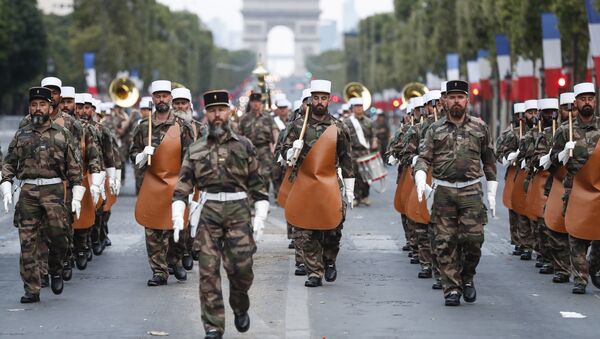The French Foreign Legion’s notoriously vicious military training strategies will be scrutinised in a Lyon court, as four officers and junior officers stand trial for manslaughter over the death of six recruits in an avalanche in January 2016.
In preparation for deployment in West Africa, the recruits were ordered to enter an area of mountainside in Valfrejus, Savoie, with sealskins, skis and rescue equipment. The uneven terrain was treacherous and weather conditions risky, on top of the exercise being conducted at an altitude of 2,600 metres.
After some hours, witnesses describe hearing a terrible cracking sound, and a cry of “Avalanche!”.
Susan Travers, drove anti-tank guns for the French Foreign Legion, leading to, literally, shitloads of medals. pic.twitter.com/CzkdPXWDWo
— Dr Fern Riddell (@FernRiddell) October 7, 2019
An official investigation found an expedition on the mountainside required extreme vigilance and knowledge of the terrain, which neither the recruits nor trainers seemingly possessed. The trial, which begins 10th October, will examine whether the officers failed to consult local mountain experts, gendarmes and weather forecasters.
Jean-Michel Quillardet, a lawyer for a Ukrainian soldier injured in the catastrophe, said the recruits were pushed to the absolute limit, while the most senior members of the unit weren’t on the march but instead involved in administrative tasks many kilometres away.
Watch the video: "Deep in the Jungle with the French Foreign Legion" on Revolvy. https://t.co/ZTuU5IT5Qq
— Danker Bierling (@GewoonDanker) October 3, 2019
“The investigation dossier is very clear: there was a risk of avalanche. First, the soldiers who decided on the exercise didn’t make contact with weather services or ski slope agents to at least inform themselves whether there was a danger or not. Second, during the march, there were witnesses who said they were ‘going through hell’. For these legionnaires, a lot from other countries, it was ‘march or die’. This is a concept of military command that seems absurd in the 21st century: officers lacked humanity,” he told local media.
A lawyer for the accused officers has denied they’d acted imprudently, and argued the avalanche was not their fault.
It’s far from the first time the French Foreign Legion’s grueling training regimen has sparked controversy, or indeed had fatal results. In 2015, four former Legion soldiers were given suspended prison sentences after a recruit died from heatstroke at the legion’s gruelling desert training camp in Djibouti. Forced to conduct strenuous exercises in 38 centigrade heat, the recruit’s water was taken from him, and his trainer ordered no more should be given to him. He was repeatedly punched for begging for water, water, before collapsing. The officers involved were expelled from the Legion after the incident.
#OTD in 1894, Eugene Bullard was born in Columbus, Ga. When WWI started in 1914, he enlisted in the French Foreign Legion and rose to the rank of corporal. #airhistory #WWI https://t.co/0RzIbOxfx7 pic.twitter.com/Cq7L3WlaLJ
— National Museum USAF (@AFmuseum) October 9, 2019
The Legion was established in 1831 by King Louis Philippe as a way for France to police its empire in North Africa. Since then, around 40,000 legionnaires have died for France, in conflicts including the Franco-Prussian war, both World Wars, Indochina and Algeria's war of independence. The male-only division is comprised of around 8,000 men of 140 nationalities. About one third hail from western Europe, another third is from eastern Europe and Latin Americans account for 10 percent. Recently, the Foreign Legion has served with NATO forces in Afghanistan.


